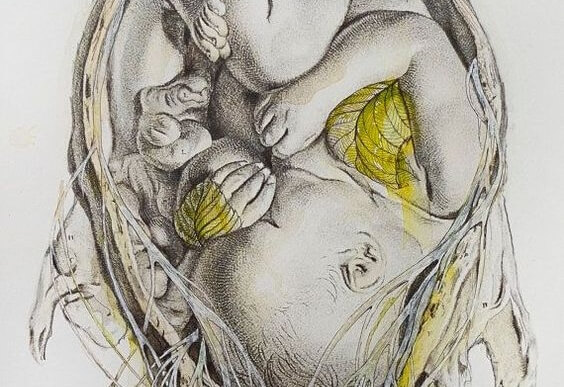Mom, Keep Me Close To Your Skin, Close To Your Soul... Detached From Fears


Written and verified by the psychologist Valeria Sabater
Mom, let your baby grow up close to you, skin to skin, breath to breath, soul to soul. Let them be very close to you for at least the first three years of their life. This way you will give the world a strong and brave child. A person who is detached from fears.
Today we will share with you the importance of brining up your child in an environment that favors physical contact. Physical contact is the best stimulus; it helps promote children’s development, confer security and well being. It also promotes neuronal connectivity towards tactile, vocal, olfactory and sensory stimuli.
“No one can reach a summit if they go accompanied by fear”—Publio Siro
In this article we want to go further than the maturational field of the child to talk about their primary instincts and the importance of raising a child that is “detached from fears.” Nowadays the word “attachment” is used very frequently, however before continuing we must clarify some terms.
In the field of personal growth, “attachment” is related to our fixation on acquiring certain things or letting go of things, or links that obstruct our freedom or identity.
On the other hand, in the context of raising a child, attachment is found in the classic Bowlby theory. It reminds us about the importance of constructing a strong and safe bond with the child in order to favor their growth and self-esteem, which will eventually allow them to develop their independence.
In this article we would like to propose the following: providing close attention and skin-to-skin contact will create positive attachment between you and your child. This way in the long term you will be able to raise a child that is detached from fears, insecurities and low self-esteem.
Fear is the most relevant instinct in the brain of a newborn

There is no place that is more safe, perfect and comfortable than the maternal womb. Nothing bad happens here, everything is serene, everything is warm, satisfying and predictable. However, birth exposes the newborn to a very strange new world.
- The first thing they feel is that they are torn from their mother’s interior and then some stranger holds them, bathes them, weighs them and handles them.
Later, after getting to know and feel their mother for the first time, they notice how every now and then they are taken to the cradle which is lonely and dark. Their fears hover over them and they feel the terror of abandonment and the sensation that they will not be able to go on…
I was just born, everything scares me
Babies are born with brains that are immature. They are governed by instincts and needs and the only things they seek are to feel safe, loved and fed.
- During the first few months if there is something that really terrifies newborns, it is the separation from their mother. At this age they are still unable to understand that just because they are left in a cradle does not mean that they are abandoned. They still do not understand that if they do not feel their mother’s warmth at a given moment, it does not mean that something bad is going to happen.
The instinct of fear is a natural reaction with a unique purpose: to help them adapt. Let us therefore avoid intensifying it unnecessarily.
Ddetachment from fears, an essential daily investment.

Experts in parenting and child psychology tell us that close to 35 percent of babies develop insecure attachments. This can be caused by growing up in an environment where parents do not favor emotional attention from an early age. A place where parents do not attend to their child when they cry or where children perceive that they cannot count on their caregivers when they need them.
This lack of attachment definitely causes a serious impact on their minds.
“There is nothing that scares me more than fear itself”—Michel Eyquem de Montaigne
An insecure attachment causes children to be dependent. They are always “attached” to their insecurities and anxieties. Attached to that rage that they still don’t know how to channel and little by little disobedience, resentment or other challenging behaviors appear.
How to encourage your child to “detach” from their fears
You have to understand that your baby has infinite needs that must be understood and taken care of.
- Keep in mind that every baby is unique. Sometimes there are children that are a lot more demanding and needy than others.
- Pay attention when they cry.
- Always keep them close to you. If you work or spend a lot of the day out of the house, when you get home use the classic baby carriers to keep them close to your skin and chest.
- Understand all their emotions, do not sanction or intensify them even more. It’s all about having patience and always being close, affectionate and consistent with your rules.
- Know their fears
- Little by little try to promote their frustration tolerance.
Finally, do not forget to encourage them and build up their self-esteem. Show them that you trust them. Let them see you as that wonderful and essential figure in their lives. One that will always provide them with security, encouragement, affection and closeness…
All cited sources were thoroughly reviewed by our team to ensure their quality, reliability, currency, and validity. The bibliography of this article was considered reliable and of academic or scientific accuracy.
- Bowlby, J. (1986). Vínculos afectivos: formación, desarrollo y pérdida. Madrid: Morata.
- Bowlby, J. (1995). Teoría del apego. Lebovici, Weil-HalpernF.
- Garrido-Rojas, L. (2006). Apego, emoción y regulación emocional. Implicaciones para la salud. Revista latinoamericana de psicología, 38(3), 493-507. https://www.redalyc.org/pdf/805/80538304.pdf
- Marrone, M., Diamond, N., Juri, L., & Bleichmar, H. (2001). La teoría del apego: un enfoque actual. Madrid: Psimática.
- Moneta, M. (2003). El Apego. Aspectos clínicos y psicobiológicos de la díada madre-hijo. Santiago: Cuatro Vientos.
This text is provided for informational purposes only and does not replace consultation with a professional. If in doubt, consult your specialist.








